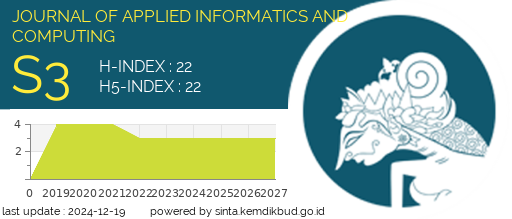Analisis Tingkat Kepuasan Pengguna Sistem Informasi Kerja Praktek dan Skripsi (SKKP) Menggunakan Metode End User Computing Satisfaction (EUCS)
DOI:
https://doi.org/10.30871/jaic.v4i1.1645Keywords:
user satisfaction, SKKP, EUCSAbstract
The advantages of information technology in the education has developed a lot, especially in universities. An example of the application of tertiary level information technology is the delivery of information presented through the university's official website. One of the web-based systems owned by the STTI Tanjungpinang is the Sistem Informasi Kerja Praktek dan Skripsi (SKKP). With this technology, the process of submitting titles to the registration of practical work trials and student theses has been switched online. Analysis of the level of satisfaction is important to know the extent of expectations and perceptions of system users in an effort to achieve the perfection of an information system and can meet user expectations. One method in analyzing user satisfaction levels is end user computing satisfaction (EUCS). Dimensions in EUCS consist of content, accuracy, format, ease of use and timeliness. This type of research is descriptive research that is intended to describe the phenomena that exist, which took place at this time or in the past. Data collection methods included observation, interviews and distribution of questionnaires with a sample of 35 respondents who were active SKKP users. The results of the analysis of user satisfaction level SKKP STTI Tanjungpinang using the EUCS method of 78.69% with a gap of 21.31% means users are in the range of satisfied categories. From the five dimensions, the variable content has the smallest gap of 8.69% while the largest gap is in the accuracy variable, which is 32.02%.
Downloads
References
Hidayat, Rahmat, 2010, Cara praktis Membangun Website Gratis, PT. Elex Media Komputindo, Jakarta
Gondodiyoto, Sanyoto, 2007, Audit Sistem Informasi + Pendekatan CobIT, Mitra Wacana Media,Jakarta
Suyanto, M., 2005, Pengantar Teknologi Informasi Untuk Bisnis, Andi, Yogyakarta
Sutarbi, T., 2012, Analisis Sistem Informasi, Andi, Yogyakarta
Pressman, Roger, 2002, Rekayasa Perangkat Lunak Pendekatan Praktisi (Buku Satu), Andi, Yogyakarta
Hutami, Rr. Rieka F., 2016, Analisis Kepuasan Pada Pengguna Sistem TCS Menggunakan Metode End User Computing Satisfaction (Studi Kasus: PT. TLK, Bandung), Jurnal Manajemen Indonesia, ISSN: -, Vol. 16 - No.1 April, 2016
Torkzadeh, Gholamreza dan Doll, William. 8 September 2017. Test-Retest Reliability of the End-User Computing Satisfaction Instrument. Decision Sciences. Vol. 22. Michigan State University, US. http://onlinelibrary.wiley.com/doi/10.1111/j.1540-5915.1991.tb01259.x/abstract
Dalimunthe, Nurmaini dan Cici, Ismiati, 2016, Analisis Tingkat Kepuasan Pengguna Online Public Access Catalog (OPAC) Dengan Metode EUCS (Studi Kasus : Perpustakaan UIN SUSKA Riau), Jurnal Rekayasa dan Manajemen Sistem Informasi, e-ISSN : 2502-8995, p-ISSN : 2460-8181, Vol.2, No.1, Februari 2016
Putra, Jefri Krisna, 2014, Student Satisfaction Analysis of SIATer Using End User Computing Satisfaction (EUCS), 3rd International Conference on Engineering & Technology Development, ISSN : 2301-6590
Riduwan, 2009, Skala Pengukuran Variabel-Variabel Penelitian, Alfabeta, Bandung
Downloads
Published
How to Cite
Issue
Section
License
Copyright (c) 2020 Nanny Raras Setyoningrum

This work is licensed under a Creative Commons Attribution-ShareAlike 4.0 International License.
Authors who publish with this journal agree to the following terms:
- Authors retain copyright and grant the journal right of first publication with the work simultaneously licensed under a Creative Commons Attribution License (Attribution-ShareAlike 4.0 International (CC BY-SA 4.0) ) that allows others to share the work with an acknowledgement of the work's authorship and initial publication in this journal.
- Authors are able to enter into separate, additional contractual arrangements for the non-exclusive distribution of the journal's published version of the work (e.g., post it to an institutional repository or publish it in a book), with an acknowledgement of its initial publication in this journal.
- Authors are permitted and encouraged to post their work online (e.g., in institutional repositories or on their website) prior to and during the submission process, as it can lead to productive exchanges, as well as earlier and greater citation of published work (See The Effect of Open Access).











